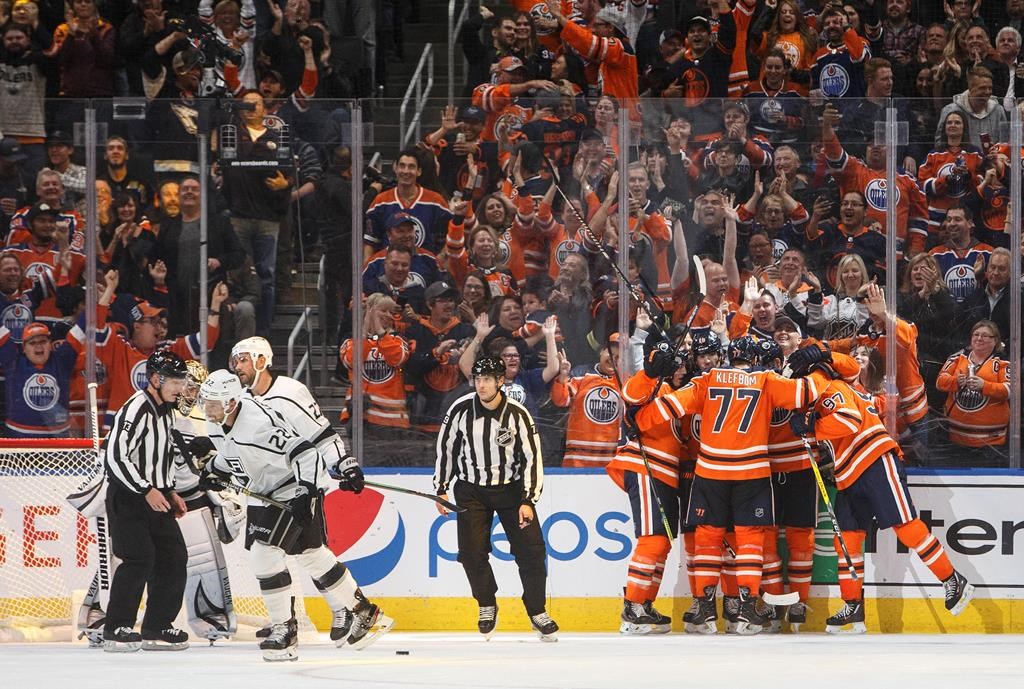It was a good run while it lasted.

Over 13 years, the Edmonton Oilers sold out 549 consecutive games. The last six games have had somewhere between 1,000 and 1,300 empty seats.
Lance Colak has been a season seat holder for the last decade. He runs a Facebook group for other season ticket holders. He says it’s strange to look around the arena now.
“You look at, especially the middle sections in the upper level, and you see all these people who aren’t there.
“You’re wondering why but then, on the other side, you sort of know why: value.”
The Oilers have made the playoffs only once in the last 13 years. The team says a tough Alberta economy makes ticket sales a little more difficult now too. The Oilers say they are trying.
“We know we have a lot of work to do to earn back the emotional investment from our fans,” said Stew MacDonald, the team’s executive vice-president of revenue.
He says the team is trying new things this year.
“Coming out much more aggressively with our weekend advantage package where every Thursday, Friday, Saturday and Sunday has a marquee promotion on it.”
Despite the Oilers’ specific challenges, attendance concerns aren’t unique.
“Definitely, we know from all the markets that there’s no magic answer. The person who has it is probably filthy rich,” MacDonald said.
Other markets are struggling to attract fans. In Ottawa, less than 10,000 people have watched some of this year’s Senator games. Calgary’s home opener didn’t sell out.

All major sports face similar challenges.
Attendance at Edmonton Eskimos games has been steadily dropping over the years. In the 80s and 90s, the team routinely attracted 40,000 and 50,000 fans to their games.

Get breaking National news
In 2017, the team played two games in front of less than 30,000 fans. Last year, that number jumped to five games, and this year, fewer than 30,000 people attended a game six different times.
In football-mad Saskatchewan, there’s a similar story.
Two years ago, the Roughriders sold out six home games. Last year, four games sold out.
This year, only the Labour Day Classic against the rival Winnipeg Blue Bombers filled Mosaic Stadium.
South of the border, the NFL is seeing its lowest attendance since 2011 and there have been four years of declining attendance at Major League Baseball Parks.
Dan Mason studies the Economics of Sport at the University of Alberta. He says the numbers aren’t surprising.
“If you look across the board at all major league sports, the demographic for the average fan is aging.”
“What we’re seeing is younger fans have other interests or other things to do, so they’re not necessarily going and attending games in the way other fans may have done 10 to 15 years ago.”
Mason says professional teams must deal in a new kind of economy. He describes it as an “attention economy.”
In the entertainment world, the scarce resource is no longer content. Instead, time to consume the entertainment is the limiting factor.
“You’re seeing this all around. There’s a marketplace out there for attention and there’s so many different things that can capture attention and the dollars of consumers.”
Teams like the Oilers recognize the new market and say they’re trying to adapt. However, MacDonald says fans do say one thing will address many of their concerns.
“Nothing like a playoff run to regenerate any market and we know that’s a key to success here in Oil Country.”

Colak would like a bit more than that. He feels ticket prices are high. If the team plans to charge that much, he wants good value.
“It feels like they could do more. Why isn’t there a pre-game tailgate in Ford Hall?”
Still, winning would help. Colak would bask in another playoff run. There has only been one in the decade he’s had tickets.
READ MORE: Edmonton Oilers season ticket prices remain unchanged for 2019-20 campaign
But he adds the team needs to know winning is no longer the only thing for fans.
“Winning solves some of the problems and losing definitely makes them much worse.”




Comments